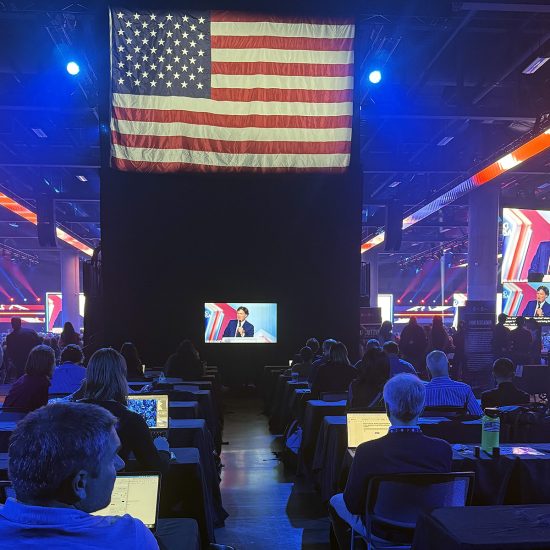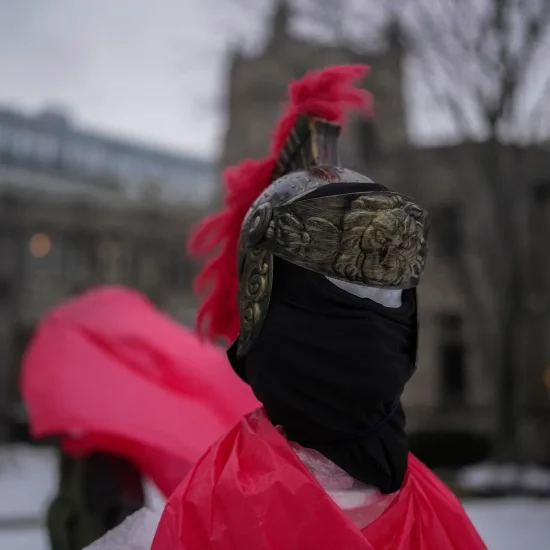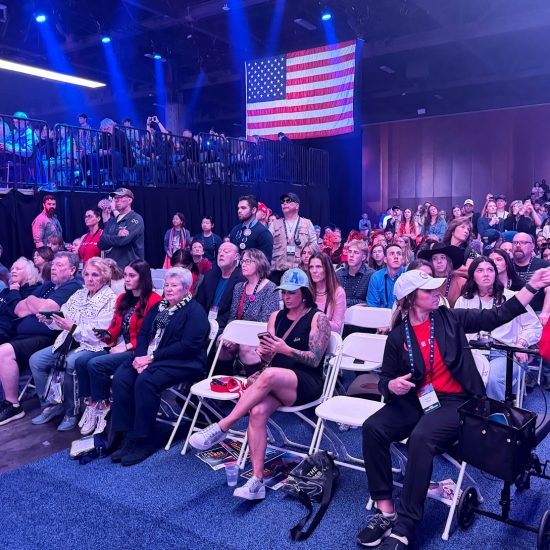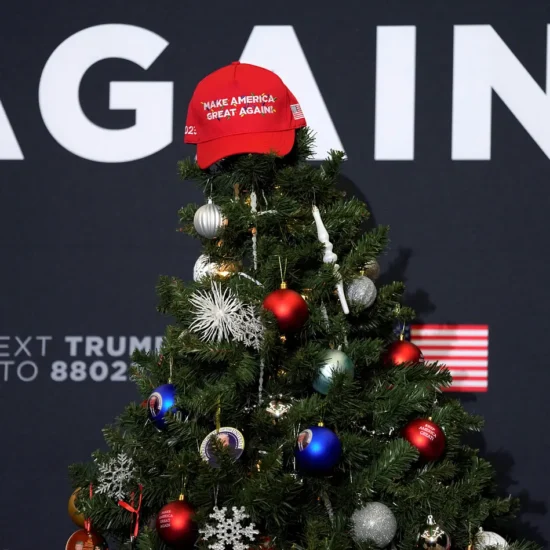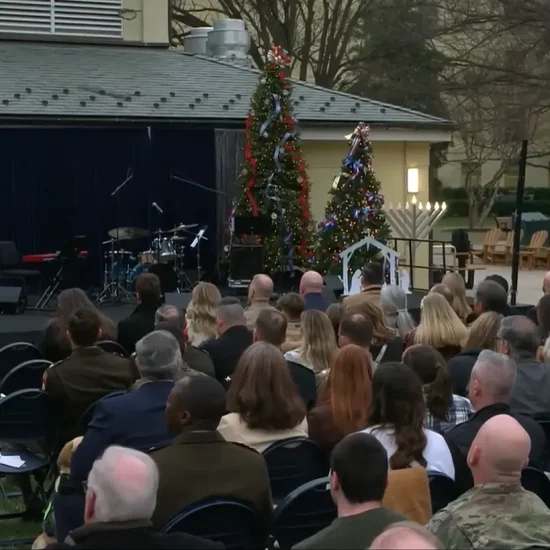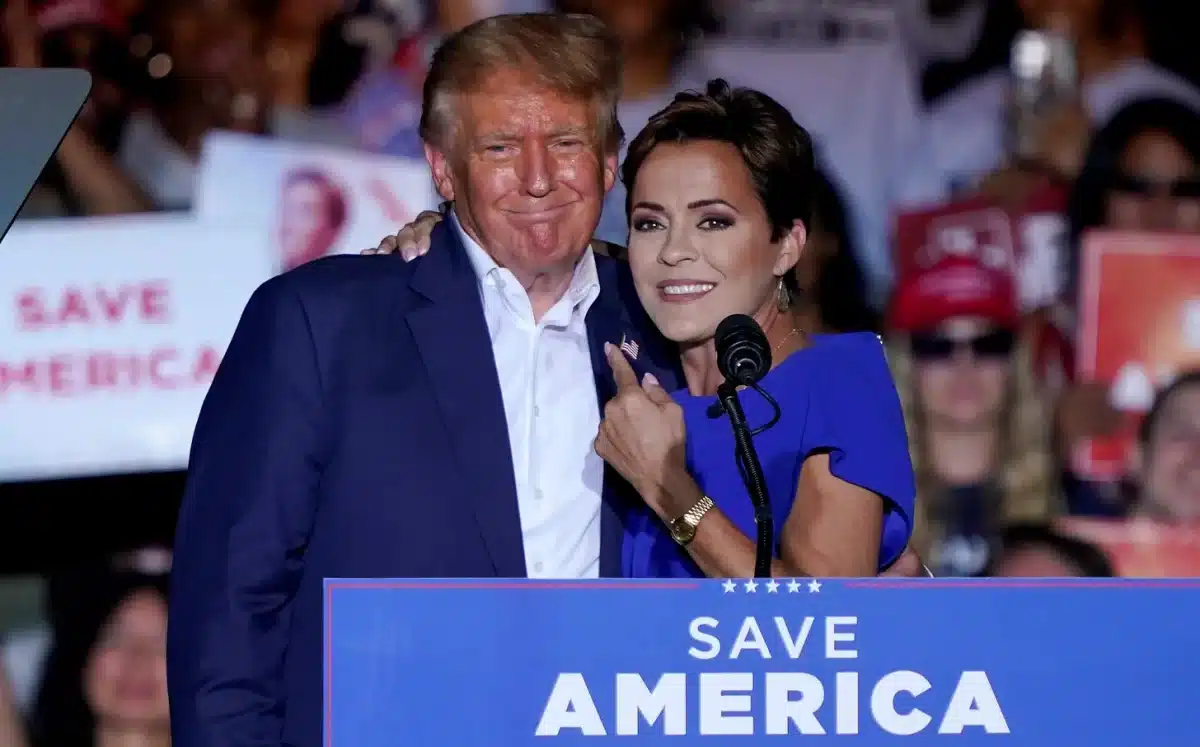
“I raise a hallelujah in the presence of my enemies.”
Christian musician Sean Feucht belted those words out last week in the presence of friends and allies. With large American and Arizonan flags behind him and “Kari Lake for Governor” signs off to each side of the stage, he led worship at a campaign event ahead of next week’s election.
“My weapon is a melody,” he sang.
Feucht’s music and words between songs are indeed a weapon. And the intended target isn’t merely a Democratic politician but democracy itself. This musical Forrest Gump of Christian Nationalism seems to pop up just about everywhere these days, from the ReAwaken America Tour to Mar-a-Largo to the National Mall with a Donald Trump video to campaign events of candidates who refuse to accept the results of the 2020 presidential election.
As Feucht warmed up the crowd for Lake on Thursday (Oct. 27), he mentioned he had performed the previous night at an event for Pennsylvania gubernatorial hopeful Doug Mastriano (that also included remarks by author and radio host Eric Metaxas). This tour across the country to sing praises for anti-democratic politicians highlights how Christian melodies, words, and symbols are being used as weapons in the fight to dismantle American democracy.
In one moment Feucht urged “everything that has breath” to “praise the Lord,” and in the next he criticized public health measures during the COVID pandemic. At one point he sang about how he was “never going to stop praising” God, and at another he prayed for the victory of politicians who tout debunked election claims. The praise wasn’t the point of these campaign concerts; it merely warmed up the crowd for the main act of election denialism.
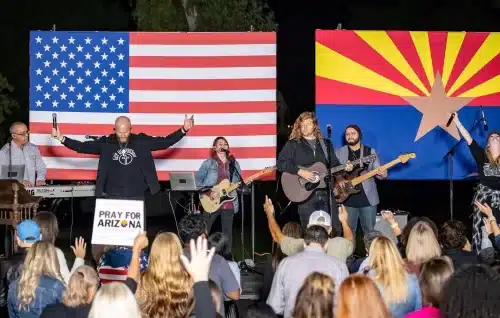
Sean Feucht (middle with guitar) leads music during a Kari Lake campaign event in Scottsdale, Arizona, on Oct. 27, 2022. (Lake campaign)
It’s no coincidence Feucht booked these stops on his tour. Since Christian Nationalism seeks to privilege a narrow understanding of Christianity in American society, it is quick to abandon democratic practices when they no longer serve its cause. That leaves Feucht and others backing candidates who don’t actually believe in free and fair elections.
“I believe we’re here tonight to champion a new move of [God’s] spirit that’s taking over politics, that’s taking over the leadership positions. This is the hour of freedom for the Church!” he declared as the band played in the background. “And it says in the Bible that when the righteous are in rulership, the people rejoice.”
So, he led the crowd in worship as they showed up for the Lake campaign’s “Freedom & Faith Revival Night” sponsored by “Evangelicals for Kari” at a golf resort in Scottsdale. In addition to Feucht’s music and remarks by Lake, the event included a time for Lake to meet privately with evangelical and Pentecostal preachers — including disgraced former megachurch pastor Mark Driscoll (not that we’re trying to throw him under the bus). The preachers laid their hands on Lake and prayed over her and her campaign. In doing so, they offered an unspoken prayer request for the demise of American democracy.
In this issue of A Public Witness, we sing a song of lament for how some Christians are helping to dismantle democracy. By looking at a candidate who represents the threat, we explore her use of religious rhetoric and practices before offering a pro-democracy chorus ahead of next week’s midterm elections.
Get cutting-edge reporting and analysis like this in your inbox every week by subscribing today!
A God Movement?
After Sean Feucht stopped singing at the Kari Lake event last week, the candidate showed up to offer the same religious tone. She argued that people should vote for her because God was behind her campaign and would move her to victory.
“Do you feel something’s happening in Arizona? Something big?” she said. “It is God. God is happening in Arizona. I’m so proud to be a part of this movement.”
Recalling the events that led to her running for office, she said it only occurred after she turned her life “100% over to God, truly for the first time.” The campaign for governor, she added, is God’s plan for her.
“He has brought me on the wildest ride. When I said, ‘God, you take me and do with me what you want,’ look where he brings us when we hand our life over to God. Isn’t it amazing?” she said. “I can thank God for this journey.”
As evidence of God working through her campaign, Lake compared her primary win to “David and Goliath” and quickly made sure people realized she was comparing herself to David and not the decapitated giant. Lake also mentioned other things that proved “God is so amazing,” like her endorsement “from the greatest president, Donald J. Trump” and her self-proclaimed ways of exposing “the fake news media.”
“People will stop me and say, ‘You know this is a movement.’ I say, ‘Yeah, it’s God,’” she added as she pointed upward. “It’s not me, it’s us and God. It truly is. He’s just using me right now as we want to be used by God. I’m running errands for God right now.”
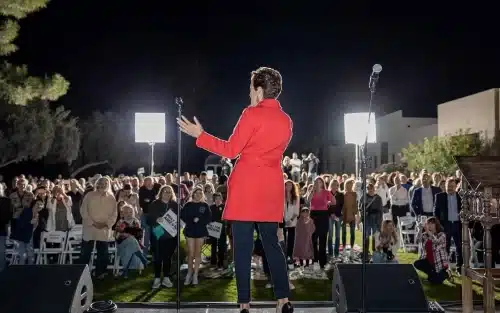
Kari Lake speaks during a “Freedom & Faith Revival Night” campaign event in Scottsdale, Arizona, on Oct. 27, 2022. (Lake campaign)
In addition to framing her campaign as proof of God at work, Lake attacked the other side as “demonic” and said it was going to take everyone to help win this election, including “our pastors.” As a sign of such a role for pastors, she referenced her time with pastors like Driscoll before the public “revival.”
“We had some amazing pastors tonight. They led the most incredible prayer. I know that prayer’s going to just propel me through the next 12 days and beyond,” she said.
That session earlier with more than 50 pastors and spouses included times for Lake to speak to the group and for them to lay hands on her while praying. Tommy Barnett, a pastor at Dream City Church in Phoenix, led the prayer of anointing. Members from that Assemblies of God megachurch, which Barnett led for decades and continues to serve on staff after his son took over as the lead pastor, sang the National Anthem and played music along with Feucht.
The church has also partnered with conservative political activist and commentator Charlie Kirk and his Turning Point USA organization. Kirk has held numerous “Freedom Night in America” events there to push Christian Nationalistic ideas. Over the summer, Kirk announced he would partner with the church to run a private school. The church’s partnership with Kirk particularly sparked controversy in 2020 when Turning Point rented the facility to host Trump for a reelection campaign event in the early months of the pandemic. The church insisted it was safe because they had installed an air-purification system that “kills 99.9% of COVID within 10 minutes” — an untested claim that quickly drew criticisms from medical experts and a cease-and-desist letter from the state’s attorney general.
The event with Feucht and Dream City is far from the only time Lake has infused God appeals into her campaign. She also shared her faith testimony last week with Glenn Beck. She framed her political activism as sparking her return to church after falling away years earlier, and she added that’s when she started wearing a cross all the time.
In addition to campaigning with the cross around her neck, she often prays at campaign rallies and has complained that the country “kicked God out of schools.” She also works in biblical metaphors to describe her campaign and politics.
“God placed us here for a reason,” she said at a rally in August. “The very same God who parted the Red Sea, the very same God who moved mountains is with us right now as we take back our country and save this republic.”
With that mindset, she sees God helping her campaign. She told supporters at an event in October, “We have God on our side.” And she declared to Republican activists at CPAC in August, “God is with us. He has chosen me and he has chosen you.” Whether God is backing her campaign or not, she does appear to be finding success.
A Rising Lake
Kari Lake’s rise symbolizes a lot of the dynamics driving our contemporary politics. A television news reporter before running for office, former colleagues attribute her initial stoking of controversy as a strategy for gaining followers on social media in an interoffice competition informally referred to as the “Hunger Games.”
“Kari became obsessed with ‘Hunger Games.’ Every day, Kari would walk up to the ‘Hunger Games’ to see how she was doing,” one of her former colleagues told NBC News. “The more controversy stirred up, the more engagement.”
Social media became both a powerful tool for directly connecting with followers and an unedited channel for Lake to stoke division and spread misinformation. She drew attention for repeated missteps, like promoting wild and baseless conspiracy theories around voter fraud and COVID-19, that brought condemnation from elites and energized her base of supporters.
Paradoxically, the trust she earned from her career in journalism and her newfound popularity as an iconoclast on social media made her a compelling political candidate. She went from trying to stop her local channel from calling Arizona for Joe Biden in 2020 to seeking the state’s governorship in 2022, with calls to imprison Anthony Fauci, attacks on her former profession, and a campaign centered on culture war themes.
Arizona’s Republican establishment, some of whom used to be considered on the fringe themselves, unsuccessfully sought to stymie Lake in the primary. Former Vice President Mike Pence supported lawyer Karrin Taylor Robson, as did incumbent governor Doug Ducey (who also chairs the Republican Governors Association). Ducey argued, “Kari Lake is misleading voters with no evidence.” Jan Brewer, Ducey’s predecessor known for her hardline stances on immigration issues and early support of Trump, also bemoaned Lake’s evolution.
“It’s kind of difficult to understand that it’s her — the same person that was the person that I knew,” Brewer said. “[Lake] never seemed extremist like what we’re seeing now as she’s running for office of the governor. She has kind of mystified a lot of people — the change that she has gone through.”
Despite this opposition, Lake won the primary by nearly 5% on the strength of Trump’s endorsement. She returns the favor by regularly casting doubt on the 2020 election results.
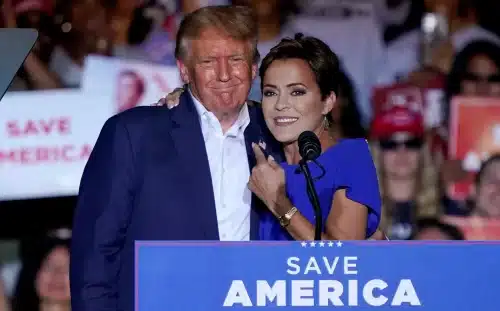
Kari Lake campaigns with former President Donald Trump during a rally on Oct. 9, 2022, in Mesa, Arizona. (Matt York/Associated Press)
“Kari Lake won [the primary] by sticking to the key, vital issue that the 2020 election in Arizona, and nationwide, was rigged and stolen,” Trump advisor Boris Epshteyn told Politico. “Kari stuck to the main MAGA issue and she won.”
Lake also confirmed the advantage of toeing the Trumpian line.
“I talk to President Trump,” she explained at a summer campaign event. “He goes, ‘I love it. No matter what I ask you, you always bring it right back to the election. I can ask you what the weather’s like in Arizona, and you’ll say, well, it’s nice, but how do I enjoy it when our elections are stolen and we don’t have a country?’”
As election day approaches, Lake’s efforts appear to be paying off. She finds herself ahead in the polls and the focus of national attention, both in the form of critical profiles from the traditional press and early chatter about a future that extends beyond Arizona.
“If Lake wins, she instantly has to be at the top of Trump’s potential VP list. There won’t be many other major officeholders as enthusiastic about his 2020 fixation as Lake,” Rich Lowry noted for Politico. “And she’s thoroughly absorbed the Trumpian practice of politics as combat and theater and can build a crowd.”
Help sustain the ministry of Word&Way by subscribing to A Public Witness!
Faith in Democracy
Lake’s potential electoral victory has stoked fears in pro-democracy circles about what her success portends. A brand of populist politics built on spreading falsehoods and restricting rights threatens to use democratic processes to advance authoritarian purposes.
“If the people who want a Christian nation with no secure voting rights and a weak independent press get 51% of the votes, they can impose that and more on the rest of us,” Michael Tomasky, editor of The New Republic, recently wrote. “That’s what we’re witnessing now, in Arizona and across the country. And there is little we can do about it.”
Tomasky doesn’t strike a hopeful note. In fact, his piece is titled “Kari Lake’s candidacy shows us how democracy self-destructs.” The alarm is warranted. This harrowing time offers valuable clarification that distinguishes between those in both parties who believe in democracy’s intrinsic value and those only participating in democracy as the means for obtaining or maintaining political, cultural, and economic power. This latter group is often willing to discard democratic values when they no longer suit their purposes or even work against their goals. And that rots away a democratic society from within.
“Democracy requires that citizens recognize one another as political equals, partners in the shared enterprise of self-government,” argued philosopher Robert Talisse in his book Sustaining Democracy: What We Owe to the Other Side.
This willingness or refusal to see each other as equals is a basic moral test that anti-democratic forces fail. For many Christian leaders, this claim of inherent equality aligns with their theology and motivates their defense of democratic institutions and processes.
“My Christian faith teaches me that all of us are created in God’s image and are worthy of dignity and respect. Democracy protects human dignity by ensuring everyone, regardless of race, class, or creed has a voice and a vote,” Rev. Jennifer Butler, founder-in-residence of Faith in Public Life, told us. “We cannot let anyone hijack faith to elevate one race or religion above another, or dehumanize any of God’s children.”
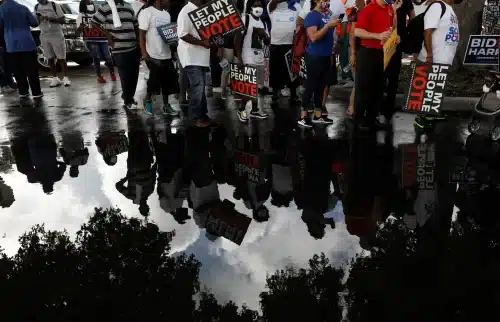
People carrying signs supporting voting rights are reflected in a puddle as they arrive at an early voting center in Miami, Florida, on Nov. 1, 2020. (Rebecca Blackwell/Associated Press)
Recognizing the threat as hundreds of election-denying candidates across the country push narratives similar to that of Lake, many Christian pro-democracy advocates are rallying to its side.
“In the ongoing struggle to become a more perfect union, faith communities have been on the front lines of expanding the right to vote, which communities of faith view as sacred,” Adam Taylor, president of Sojourners, told us. “The very health and legitimacy of our representative democracy is tied to ensuring that people can exercise this sacred right.”
That’s why Taylor has been encouraging clergy to serve as poll chaplains.
“Through the Faiths United to Save Democracy campaign, faith leaders are working to protect the freedom to vote, which we believe is central to affirming the Imago Dei, the image of God in each and every person,” Taylor added. “Efforts to intimidate, suppress, or disenfranchise voters are anti-democratic and from a spiritual and theological perspective represent an attack on Imago Dei.”
We add our voices to those concerned about the deliberate efforts to undermine core democratic principles, including the spreading of lies about the 2020 election, the efforts to make it harder for citizens to vote, and incidents of political violence like the Jan. 6, 2021, insurrection and the attack on Speaker of the House Nancy Pelosi’s husband.
Democracy is on the ballot in these midterm elections. And because of its importance, we’ve become single-issue voters. If a candidate doesn’t believe in democracy, we won’t vote for them in a democratic election. If a candidate can’t tell the truth about the last election, we won’t trust them in the next one.
But adding to our fears about candidates like Kari Lake undermining democracy is a concern that too many Christians are aiding the effort to dismantle democratic principles. Some seem too happy to sing “hallelujah” as they cheer on democracy’s end. We refuse to sing along.
As a public witness,
Brian Kaylor & Beau Underwood


